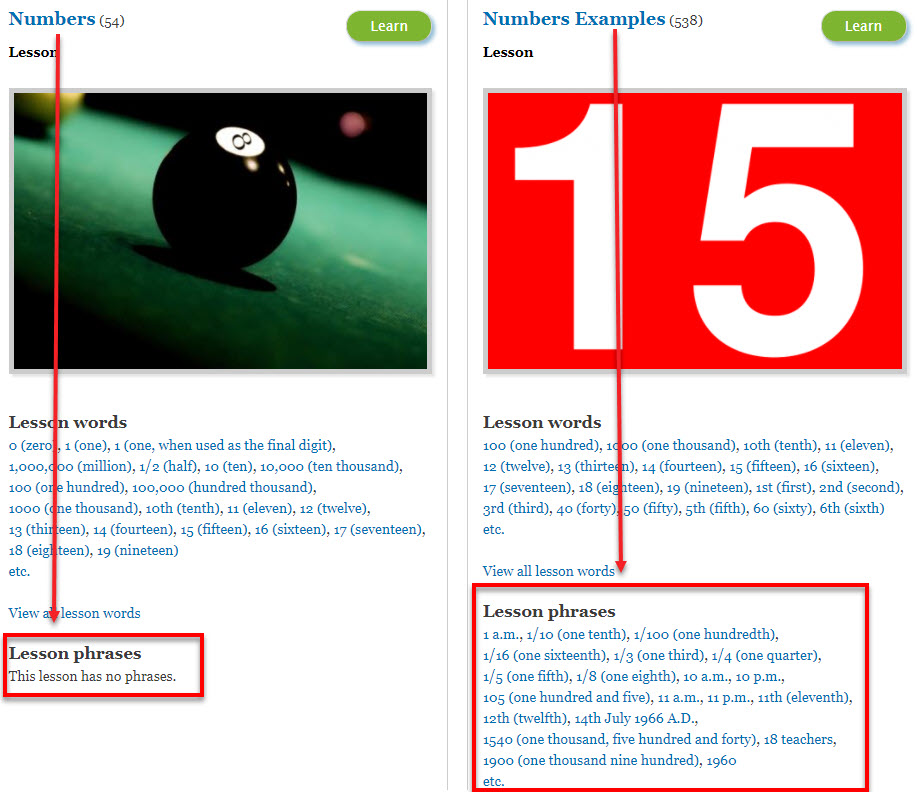A few things to note about numbers:
Number titles
For the title of a number, put the text in English in words in the English field, put the number in digits in the Clarifier field and the number in text in the target language, e.g.
This will display to the user as follows:
Some examples:
Numbers in phrases
When a (large, currently non-existent) number occurs in a phrase, create a single recording for the whole number, e.g. for the phrase "1540 baht", create a recording for the complete number , so that the breakdown is:
- "1540 (one thousand, five hundred and forty)"
- baht
For example, breakdown, "14th July 1789" as:
- 14th
- July
- 1789
NOT as:
- 14th
- July
- 17
- hundred
- 89
Numbers: words or phrases?
It was not easy to decide whether numbers are words or phrases, or a mixture of both. Three options were considered:
- all numbers should be classified as words (it makes sense for something like "three" and "five" to be words, but not so obviously for things like "five hundred", "six thousand two hundred and seven")
- all numbers should be classified as phrases (although this makes sense for things like "six thousand two hundred and seven", it doesn't seem to make much sense for things like "three" and "five")
- numbers should be classified as a either a word or a phrase, depending on the number (easy to decide "three" and "five" are words and things like "six thousand two hundred and seven" are phrases, but isn't easy to draw a line since things like "five hundred" would be a phrase, but maybe not "one hundred", and what about things like "twenty" or "twenty three"?)
The rule decided is as follows: if the English form uses one word it is classified as a word, if the English form uses more than one word it is classified as a phrase.
Words, e.g.:
- zero
- one
- five
- ten
- twelve
- seventeen
- twenty
- thirty
- fifty
- hundred
- thousand
- million
Phrases, e.g.:
- twenty-one
- thirty-eight
- fifty-six
- one hundred
- two thousand
- five thousand seven hundred and fifteen
- one fifth
- two thirds
- three quarters
Lingopolo will automatically put the words into the Numbers lesson, so the Numbers lesson should have zero phrases. Lingopolo will put all these phrases into the lesson of Numbers Examples.

Why are numbers like twenty-one not classified as numbers?!?
What we classify as phrases will automatically be part of the Numbers Examples lesson, since that lesson contains all phrases which use any of the numbers.
So, we will have in the Numbers words lessons entries like:
- one
- five
- nineteen
- twenty
- seventy
- hundred
- thousand
And then we will have in the Numbers examples lesson (which has phrases), entries like:
- twenty-one
- seventy-five
- one hundred thousand
- nineteen seventy-five
Basically, you do not need to classify entries like 153 or 1989 as numbers (and you should not), because they will be automatically assigned as examples of the numbers which they use.
A number like 2000 (two thousand) will be an example phrase to practice the word two and the word thousand. So, 2000 should be labelled as a phrase and not put in the Numbers lesson (the software will automatically add it to the Numbers Examples).
A number like 1963 will be an example phrase to practice the word nineteen and the word six and the word three. Se 1963 should be labelled as a phrase and not put in the Numbers lesson (the software will automatically add it to the Numbers Examples).
